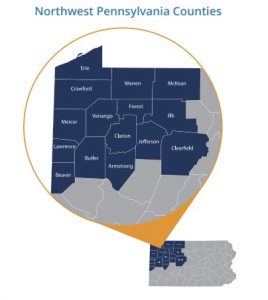Combat Veterans, Killing and Suicide
 The Northwest Pennsylvania (NW PA) Veteran Suicide Prevention Program operates on a three-pronged approach involving healthcare providers, community organizations, and Veterans and their families in the 15 counties of NW PA. This article summarizes a recent presentation by Lee Wagner, Senior Program Implementation Specialist, and explores the following topics:
The Northwest Pennsylvania (NW PA) Veteran Suicide Prevention Program operates on a three-pronged approach involving healthcare providers, community organizations, and Veterans and their families in the 15 counties of NW PA. This article summarizes a recent presentation by Lee Wagner, Senior Program Implementation Specialist, and explores the following topics:
- The lived experiences of combat Veterans.
- How specific types of combat exposure impact suicidal ideation and suicidal attempt.
- The Combat Exposure Scale.
- Healing efforts for those with combat exposure.
Read time: 7 minutes
A pdf of the presentation, including sources, is available for download.
Please note this article contains graphic details that may not be appropriate for all readers.
The Lived Experiences of Combat Veterans
 The lived experience of a Veteran is personal and unique. However, there are four characteristics shared among combat Veterans who served during conflicts or war.
The lived experience of a Veteran is personal and unique. However, there are four characteristics shared among combat Veterans who served during conflicts or war.
- They, or their families, may feel they “came home different” and are seemingly unrecognizable to their prior self.
- Reports of moral injury, or shifting of one’s moral compass, as a result of war and combat experiences.
- Feeling burdened with knowledge and memories that most civilians will never fully understand or share.
- Having an extreme need to remember comrades who died due to combat and war.
Combat Exposure and Combat Impacts Suicidal Ideation (SI) and Suicidal Attempts (SA)
 Data analyzed from The National Health and Resilience in Veterans Study (NHRVS), a nationally representative study of 3,157 U.S. veterans conducted in 2011, showed that combat experiences involving direct exposure to death, killing, or grave injury exhibited the strongest associations with suicidal behavior. In addition, data showed that while participating in patrols and coming under enemy fire had a negative impact on SI/SA, killing and witnessing death showed a significant increase in SI/SA, over and above sociodemographic characteristics and lifetime trauma burdens.
Data analyzed from The National Health and Resilience in Veterans Study (NHRVS), a nationally representative study of 3,157 U.S. veterans conducted in 2011, showed that combat experiences involving direct exposure to death, killing, or grave injury exhibited the strongest associations with suicidal behavior. In addition, data showed that while participating in patrols and coming under enemy fire had a negative impact on SI/SA, killing and witnessing death showed a significant increase in SI/SA, over and above sociodemographic characteristics and lifetime trauma burdens.
While helpful in showing the relationship between combat and SI/SA, the research has limitations. These include:
- Self-reported data.
- Questions focused on lifetime suicidal behavior, not just post-combat exposure.
- The majority of respondents were Vietnam Veterans (48.4 percent) and older white males.
- This investigation examined non-fatal suicides rather than completed suicides.
The Combat Exposure Scale
 Those screening for SI/SA should understand the impact of combat exposure and how different experiences impact risk. The Combat Experiences Scale (CES) is a 33-item measure that assesses deployment-related experiences. The CES includes questions such as:
Those screening for SI/SA should understand the impact of combat exposure and how different experiences impact risk. The Combat Experiences Scale (CES) is a 33-item measure that assesses deployment-related experiences. The CES includes questions such as:
- Did you ever go on combat patrols or have other dangerous duties?
- Were you ever under enemy fire?
- What percentage of the soldiers in your unit were killed, wounded, or missing in action?
- How often did you fire rounds at the enemy?
- How often were you in danger of being injured or killed?
Killing and witnessing death has serious consequences on veterans’ mental health and moral injuries, thus the importance of comprehensive screening during diagnostic intake.
Healing Combat Exposure
 War wounds require healing the soul. Outside of traditional talk therapies and psychological remedies, other paths include:
War wounds require healing the soul. Outside of traditional talk therapies and psychological remedies, other paths include:
- Developing acceptance of the warrior nature
- Undertaking practices for purifying the soul
- Having a welcoming community that honors shared sacrifice
- Participating in storytelling and sharing
- Engaging in spiritual and existential work
Looking to Get Involved?
 Whether you identify as a healthcare provider, community organization, or Veteran, there are several opportunities through the NW PA Veteran Suicide Prevention Program and PERU to connect to resources, participate in educational training, and promote harm reduction strategies. We are actively recruiting healthcare and community partners to work with us in meeting our goals and objectives. To learn more, visit the program website at theresilientveteran.org.
Whether you identify as a healthcare provider, community organization, or Veteran, there are several opportunities through the NW PA Veteran Suicide Prevention Program and PERU to connect to resources, participate in educational training, and promote harm reduction strategies. We are actively recruiting healthcare and community partners to work with us in meeting our goals and objectives. To learn more, visit the program website at theresilientveteran.org.
Need Help? Know Someone Who Does? Contact the National Suicide Prevention Lifeline at 1-800-273-TALK (1-800-273-8255) or use the online Lifeline Crisis Chat. Both are free and confidential. You’ll be connected to a skilled, trained counselor in your area.

